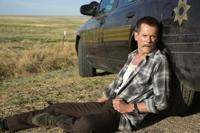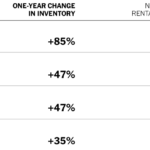
This has been a very good week for the Colorado film industry, though it would take a year of good weeks for the state to fully catch up to neighboring New Mexico and Arizona when it comes to attracting major Hollywood production companies to Colorado.
On Tuesday, Gov. Jared Polis signed two pieces of legislation that are expected to make Colorado more competitive in the film industry.
The first guarantees $5 million in annual film incentives to the Colorado Office of Film, Television and Media through at least 2029. Colorado Film Commissioner Donald Zuckerman said his office received a one-time $5 million rebate from the general fund for the 2023-24 fiscal year. But Polis’ action Tuesday creates a tax credit that will come out of TABOR refund money every calendar year through 2029.
“We’ve never had money allocated to us for more than one year at a time before,” Zuckerman said. “Just think about it for a second. Let’s say you’re a TV production company and you’re looking for a place to set up a TV series. Now, nobody goes anywhere without film incentives. They just don’t. But if you come to Colorado, what happens if your show gets picked up for a second or a third year? You might not get any money for the second year. This bill that the governor has signed gives us an opportunity to attract companies that are looking for something more permanent – because it guarantees incentives for more than one year.”
One person who was very happy about Tuesday’s bill signing at the Stanley Hotel in Estes Park was state Rep. (and co-sponsor) Leslie Herod, who has seen just about enough of the Georgia Peach at the end of so many films and TV shows, thank you very much.
“The reason I am so passionate about film incentives and supporting our creative industries across the board is because I believe it’s important that Coloradans tell Colorado stories,” Herod told The Denver Gazette. “I see movies and TV shows all the time, and they say they’re in Colorado, and then it doesn’t really look like Colorado to me. And then I see a Georgia Peach at the end – and we don’t actually get any benefit from that.”
But to put the state’s welcome $5 million annual commitment into perspective, consider what our neighboring states spend on annual film incentives: New Mexico: $110 million; Utah: $12 million; and, next year, rapidly rising Arizona will spend $125 million, Zuckerman said.
“We’re never going to be New Mexico,” he added. “But $5 million gets us into the game.”
Some have criticized film incentives as tax giveaways, but the numbers say something very different. This bill, for one, requires any qualifying visiting production company to spend at least $100,000 in Colorado.
“And there is an 18-to-1 return on investment for every dollar that is spent on film incentives in Colorado,” Herod said. “That means money going to a small mom-and-pop diner in southern Colorado; or to a rancher on the Eastern plains who has licensed his farmland to a film company; or to a union member who’s able to get a job on a union site in Colorado as opposed to having to leave the state. All of that really matters.”

FILE PHOTO: The Stanley Hotel in Estes Park, Colorado. Photo Credit: pabradyphoto
Second piece of good news
Polis’ second action Tuesday was to sign what is being called “The CECFA Bill” – that’s an acronym for the Colorado Educational and Cultural Facilities Authority, a state agency that has issued $7.6 billion in tax-free bonds for cultural and educational organizations since 1981.
What it really has to do with is ownership of the Stanley Hotel, which is rapidly becoming the nerve center for film and TV production in Colorado. Recently, a planned sale of the historic hotel to an Arizona-based nonprofit organization fell through.
So CECFA stepped up with a plan to buy the hotel that inspired Stephen King to write “The Shining.” But, until now, CECFA has not been allowed to actually own anything. Polis’ signature clears the way for CECFA to buy the property and issue $400 million in bonds to pay for a planned expansion that will include 60 new rooms, a new restaurant and the construction of the proposed Stanley Film Center. That is being imagined as a giant film center and museum devoted to scary movies on its property.
“This way, we keep everything in Colorado and nothing goes to Arizona,” Zuckerman said.

The Sundance Institute’s esteemed Directors Lab program shifted from Utah to Estes Park for the summer of 2024, and has since decided to come back in 2025. Pictured above is work on Brandon Cruz’s film “After Love.”
The third cherry
Also last week, the Sundance Institute wrapped up its prestigious annual Directors Lab at the Stanley Hotel and the surrounding area. It was the first time in its 40 years that the showcase event has been held outside of Utah – and it went so well, Zuckerman said, that Sundance already has committed to bringing it back to Estes Park in 2025, and perhaps beyond.
The Directors Lab, with support from Colorado’s state arts office, gives first-time feature directors the opportunity to rehearse, shoot, and edit scenes with actors and crew through a three-week filmmaking immersion experience in the wilds of Colorado.
“Everybody had a really great time,” Zuckerman said. “They loved the Stanley. They loved Estes Park. Sundance is very into the ethos of the place. That’s what they care about most. They want a place that is welcoming, and nurturing, and is a beautiful and inspiring and safe place to work.
“The hope is that some of these directors will come here and fall in love with Colorado. Hopefully, most of them are going to want to come back and make their movies here.”
Herod and Zuckerman both see Estes Park’s growing evolution as Colorado’s film capital.
“I absolutely see it as a definite catalyst for film in Colorado,” Herod said.
For Zuckerman, “Colorado is the easiest sell on earth,” he said. “They want to come to Colorado. They know we have everything but the ocean. We have fantastic weather, and we have a flight from L.A. to DIA every day. And if you’re a movie star, you want to be in a place where you don’t have to say to yourself, ‘Well, gosh, what do I do here when the weekend comes?’ ‘Do you think they’ll have any good restaurants?’ Every movie star who has ever been to Colorado likes Colorado. And when the weekend comes they can go to Vail or Aspen or Breckenridge or wherever they want to go.”
Polis added: “Supporting our creative industries like film will strengthen our local economy, enhance tourism and solidify Colorado as the best state to visit and work in. This bill will help bring filmmakers to the many community gems in Colorado, just like the Stanley Hotel here in Estes Park.”
And soon maybe we’ll start to see fewer truly traumatizing films like 2018’s “The Front Runner,” a biopic of Colorado Sen. Gary Hart starring Hugh Jackman that included not one frame filmed in Colorado but did have a scene showing Hart announcing his presidential candidacy from an alternate-universe version of Red Rocks that looked more like the surface of Mars. That movie was filmed entirely in Georgia and ended with … yes, that (bleeping) peach.
For Herod, the breaking point was the Netflix TV series “Sweet Tooth.” “It was a really good film, even though it was unfortunately about a pandemic,” she said with a laugh. Not so funny: The series follows a young boy’s journey from Yellowstone Park in Wyoming down to Red Rocks, because that’s the last place he saw a photo of his mother.
“When he entered Colorado, it looked nothing like us,” Herod said. “The mountains were in the wrong spot. The city looked nothing like Denver. It was just absurd.”
And at the end of the credits: “Sweet Tooth was filmed in New Zealand.” That’s about as far from Colorado as you can get.

”Cop Car,” filmed in Colorado Springs and Fountain, starred Kevin Bacon. Jon Watts, a Fountain native and Fountain-Fort Carson graduate, directed the film in a variety of spots around Colorado Springs and Fountain. Bacon was seen all over town during the 12-day shoot, including on the Manitou Incline.

Jane Fonda and Robert Redford starred in “Our Souls at Night,” a Netflix film based on the Kent Haruf novel and made in Colorado.

The Colorado-based “Hard Miles,” starring Matthew Modine (“Stranger Things”) was named audience favorite at the 2023 Denver Film Festival.
















